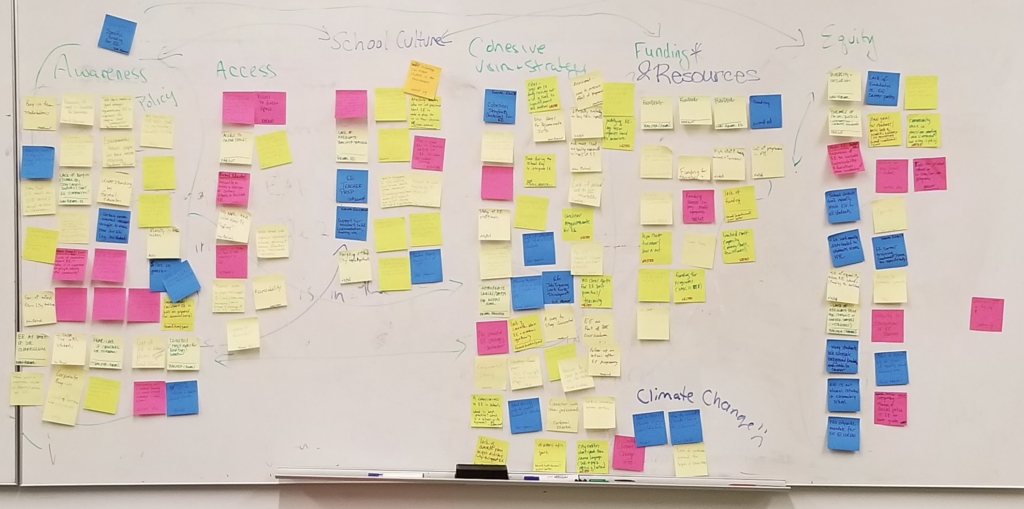
Spring 2021 Chair’s Message
Happy Spring!
Environmental Educators have now spent an entire year adapting to teaching virtually and using completely new tools and techniques to reach students and teachers. Even with the challenges of the past year, l walked away from our virtual annual meeting in December completely inspired. At the end of that meeting, we asked folks to finish the following sentence: In 2021, I am committing myself to _____. Here are a few of the responses:
- I am committing myself to more accountability to my communities, both professionally and personally.
- I am committing myself to do more volunteer work.
- I am committing myself to going outside my comfort zone to try new ways to engage students and educators.
- I am committing myself to organizing more networking programs with EEAC!
- I am committing myself to creating remote-learning climate change resources and brainstorming professional learning sessions with partners.
The EEAC steering committee has committed to listening and learning what our members and the wider environmental community needs. To reach some of these goals, we have been building an architecture that will increase equitable access to EE resources. Some of the recent work we’ve been up to:
- Created an EEAC YouTube channel for uploading recordings of our virtual programs
- Created an Instagram page for sharing Environmental Education job postings
- Developed the Professional Learning Database, a one-stop shop for organizations to spread the word about their professional learning opportunities and a spot for educators to match with an organization that fits their needs.
We’d love to hear what you’re committing to for 2021 and how EEAC might be able to connect you to other professionals that can help you reach your goals! Please reach out to River at info@eeac-nyc.org if you’d like to learn more about EEAC or volunteer with us! We’d love to have you join a meeting and sort out how to get involved.
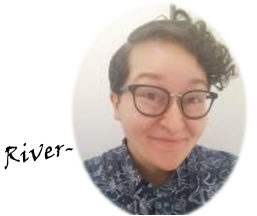
EEAC Newsletter
Environmental Education Advisory Council
This newsletter is a publication of the Environmental Education Advisory Council (EEAC), a voluntary organization of educators, classroom teachers, administrators, and other professionals in active support of quality environmental education.
Newsletter Editor: Bonnie McGuire
If you would like to submit an article for the newsletter, please email it as a file document attachment to info@eeac-nyc.org.
The Environmental Education Advisory Council of New York City cultivates an inclusive community committed to increasing its capacity to understand and address NYC’s environmental and related societal challenges.
Join us and become a member of EEAC.
For details, visit our membership page.
EEAC Officers & Steering Committee
Steering Committee Meetings
Please visit the EEAC Events page for upcoming meetings or contact an EEAC Steering Committee member. Steering committee meetings are open to anyone interested in learning about environmental education in New York City and sharing information about special programs and projects.
STAY IN TOUCH!
Members, keep up with the latest EEAC news on
EEAC-NYC@googlegroups.com
If you would like to join the listserv contact Carol Franken at carolfranken@gmail.com
Environmental Education Advisory Council of New York City
NYU Wallerstein Collaborative
Attn: EEAC
239 Greene St, 4 FL
New York, NY 10003
eeac-nyc.org
Statement of Support for Black Lives Matter
July 2, 2020
The Environmental Education Advisory Council fully supports Black Lives Matter, demands justice for those harmed by police brutality, and continues to fight against racial injustices and inequalities within the environmental field. The work of environmental educators must always be placed in the context of what is relevant and important to our students. Right now, there we must take a stand for dismantling white supremacy and in opposition to police brutality that keeps entire communities living in fear.
How can we encourage our students to explore the outdoors when the color of their skin puts them in danger of police violence? How can we show a child how to use binoculars, knowing the harassment Christopher Cooper faced in Central Park while birdwatching?
Not only do Black lives matter, Black people are worthy of every opportunity, every support, every resource available to anyone else in this country – and we have a lot of work to do to help make that happen. Racism in the United States is systemic; it is baked into every agency, every organization, every field. Work needs to be done both inside EEAC and within the environmental education field to dismantle white supremacy and elevate the needs of Black and Indigenous communities. EEAC is committed to doing this work.
We also have a responsibility to re-examine the intersectionality of racial and environmental justice and to promote or develop practices that promote racial equality. In this effort we want to engage with people of color to help us revamp EE.
In the interest of elevating Black voices, we encourage members to read this linked document written by an international collective of Black environmental leaders on the history of racism in our field and exactly what organizations can do to combat it. We encourage member organizations to look closely at their internal practices, policies, and culture to see where action can be taken to combat white supremacy. EEAC will be using this document to improve our own practices and hold ourselves accountable. Statement on systemic and pervasive racism within the environmental field People of African descent in Africa, the US and Europe.
Lastly, we look to members for wisdom, for leadership, for ideas. Please reach out with ways we could be doing better or how your workplace is confronting racism and dismantling white supremacy. We look forward to continuing this conversation and supporting each other through this important work.
Science Learning & Public Engagement:
A New Major at the City College of New York
March 10, 2020
I am pleased to announce that the City College of New York just launched a new undergraduate major called Science Learning and Public Engagement. This new major is the only program in New York City specifically designed to prepare undergraduates for non-formal science education careers at the City’s cultural institutions, environmental education centers, government agencies, and community-based organizations.
The program is designed to build student expertise in the multiple subject areas necessary for becoming successful educators in out-of-school settings. First, we require students to complete a sequence of courses to build science disciplinary expertise. I am most excited that in addition to including traditional scientific disciplines like biology and earth science, we also include an environmental track. I am hopeful that the inclusion of the environmental track, will expand access to environmental careers for many of our first-generation college students who currently are not aware of the many potential environmental education career possibilities.
Students will also take a set of courses focused on learning and education pedagogy.
These courses have two goals: 1. To expose students to education best practices through immersive science learning experiences. 2. To expose students to some of the learning aims of the formal classroom setting, since many out-of-school programs work closely with teachers and schools.
Finally, the center piece experiences of the program are two required internships. These internships will develop our students’ potential to engage a diverse audience of learners. It is my hope that CCNY’s new program can connect our students to the incredible work of the non-formal education field. I particularly look forward to the potential to build strong internship partnerships with environmental education organizations citywide. Please contact me if you are interested in hosting our students in internships. We are recruiting our first student cohort to begin our program this fall and I hope to report back to let you know how things are going.
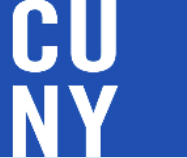
Yael Wyner
Associate Professor
Curriculum & Instruction, Biology,
City College of New York,
City University of New York
212-650-5869
ywyner@ccny.cuny.edu
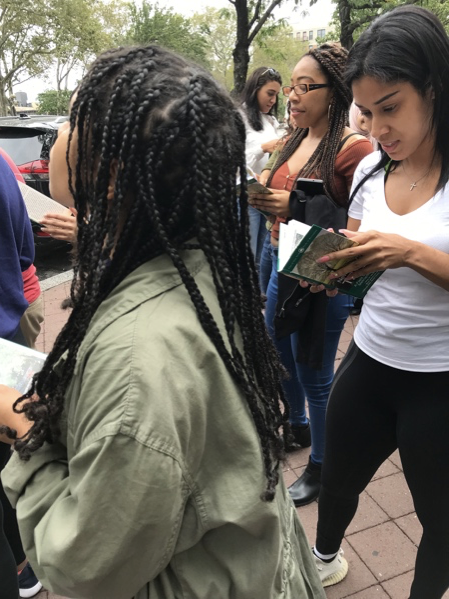
City College undergraduate students learning about New York City trees through mounting and identifying tree specimens and by examining street trees outside. This course, focused on New York City street trees, is a requirement for the new major.
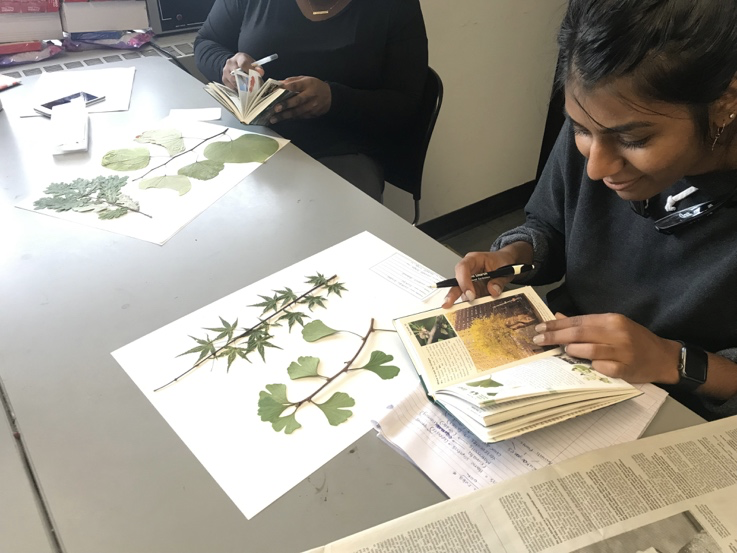
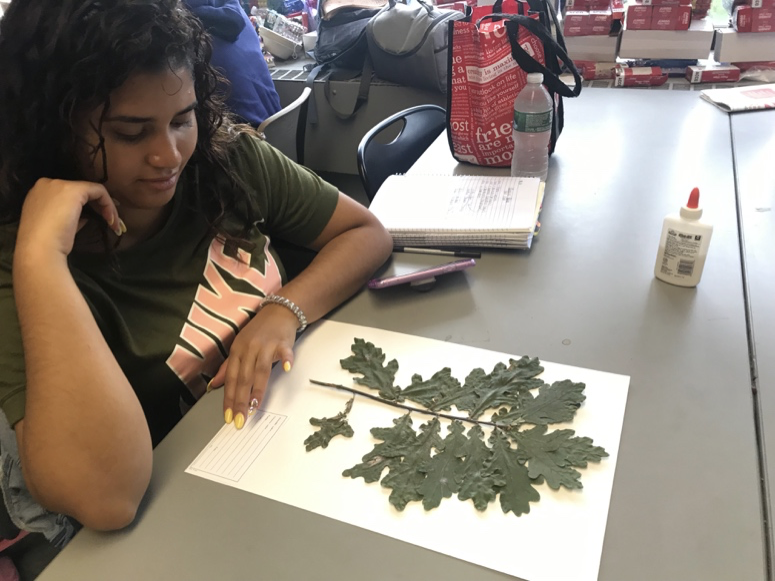
Strategic Planning Update
By Bonnie Ralston
As many of you know, in late September 2019, EEAC officially adopted a new organizational mission statement.
The Environmental Education Advisory Council of New York City cultivates an inclusive community committed to increasing its capacity to understand and address NYC’s environmental and related societal challenges.
That succinct statement is the result of the work of a dedicated group of volunteers, who met ten times over the course of 12 months to critically reflect on the current field of environmental education in NYC, and explore how EEAC can evolve to best meet the needs of the community.
Members of the Strategic Planning Subcommittee (SPS) were selected for the perspective they brought to the conversation. The resulting committee was comprised of 13 individuals, who together represented diverse stakeholder interests that included suppliers, government, clients, donors, substitutes, potential entrants, and organizational administration.
For most SPS members, strategic planning was a new experience. We were fortunate to have strategic planning consultant Bruce Spierer volunteer as a guide through the process. Bruce was no stranger to EEAC—it was his mission delivery assessment, performed in fall 2016 that revealed the need for EEAC to re-engage with the strategic plan process. Having last occurred in 2002, we had our work cut out for us.
Once the group had confirmed the need for a new mission statement, using criteria outlined by William F. Meehan in his 2008 article “Making Missions That Won’t Creep” published in Stanford Social Innovation Review, the group’s next task was clear—to learn from our stakeholders what needs were not being currently met in NYC’s EE community. Understanding that it would be impossible to interview every single individual in NYC affiliated with EE, the subcommittee opted instead to interview individuals who represented 10 distinct stakeholder categories: funder, student, parent, policy maker, formal non-formal educator, nested organization, client organization, grantor, and DOE administration.
The data collected from the 23 interviews was then sorted and re-sorted using an affinity mapping process, from which themes, and a nascent mission statement emerged. This statement was then proofed against mission statements of EE-focused organizations on regional and national levels to ensure that our work would complement, and not duplicate, efforts already underway.
After member review period and final word smithing, the mission statement was officially adopted on September 18, 2019. A subset of the original SPS is now hard at work, crafting a Strategic Roadmap that will help EEAC deliver on this new mission. That work is expected to conclude by the end of February. Stay tuned!
EEAC
45th Anniversary
Annual Meeting
On Thursday November 14, 2019 the Environmental Education Advisory Council of NYC celebrated its 45th Anniversary at the Grow with Google space in Manhattan. Attendees of the annual meeting spanned generations, with members who have been part of EEAC since 1974 and current students just joining for the first time. The theme for the meeting centered around the future of climate education in New York City.
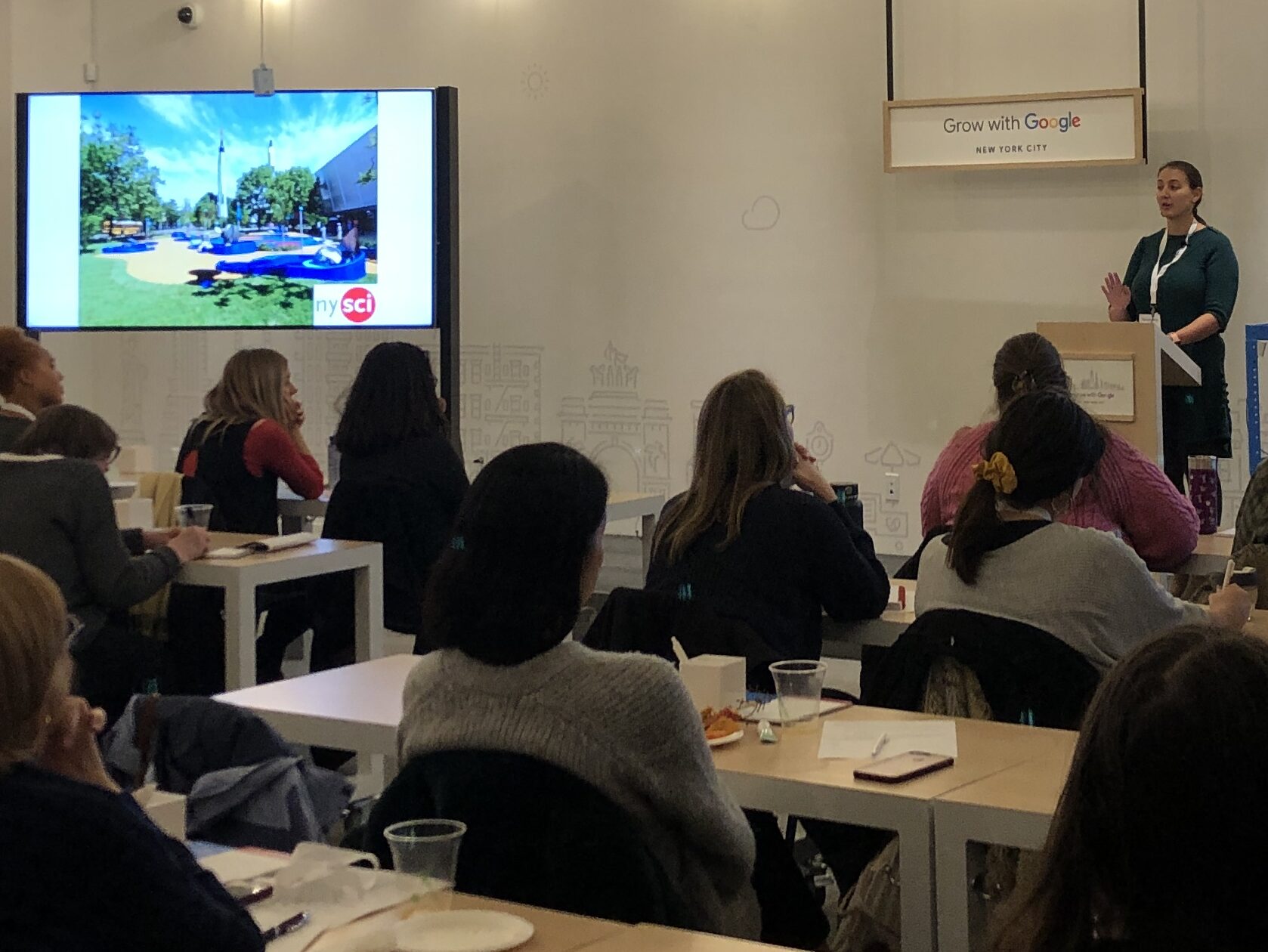
EEAC’s Chair, River DiLeo, presented on some of EEAC’s major accomplishments during 2019. One highlight was our partnership with NYC Department of Education to launch a series of partner institute workshops designed for DOE to keep partner organizations up to speed on new educational standards such as the updated New York State Science Learning Standards (NYSSLS), as well as new initiatives such as Culturally Responsive Teaching.
Chair River DiLeo also recognized Board Member Bonnie Ralston who led a dedicated team of volunteers, with help from facilitator Bruce Spierer, to go through a mission statement development process. The strategic planning committee developed the following new mission statement for the organization.
The Environmental Education Advisory Council of New York City cultivates an inclusive community committed to increasing its capacity to understand and address NYC’s environmental and related societal challenges.
Board Member Sarah Pidgeon announced plans for an EEAC Climate Education Conference for Saturday, December 5th, 2020 and encouraged members to join in the planning process for the event.
Following the announcements, two speakers were invited to discuss climate education in NYC.
The first speaker was Michaela Labriole, the Director of Strategic Education Initiatives at New York Hall of Science. Michaela has over a decade of experience in climate change education, and past projects include the NSF-funded Climate and Urban Systems Partnership and Communicating Climate Change. In her presentation, Michaela discussed the growth of systems-based climate change education and the promise of partnership in creating an “ecosystem” of climate change learning in NYC.
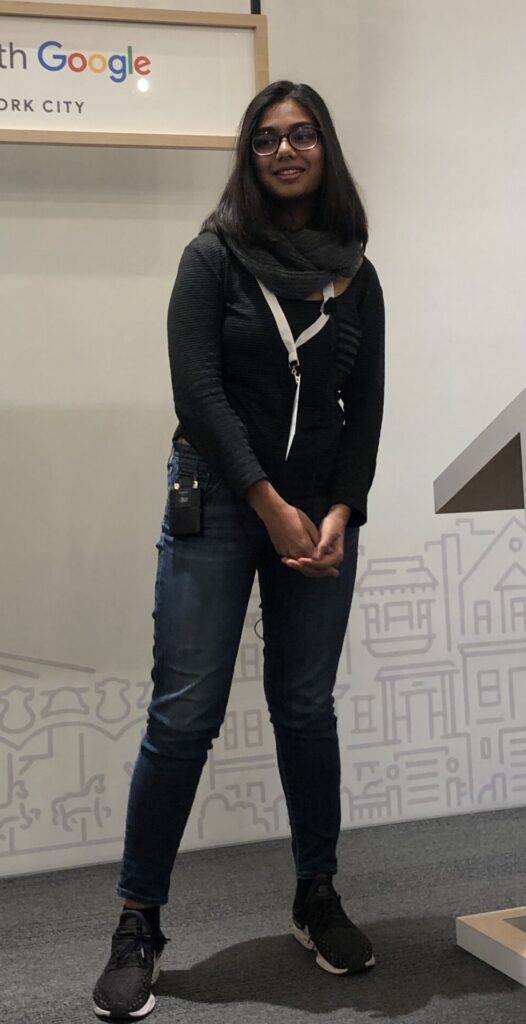
Our second speaker was Aryaana Khan, a college freshman majoring in biochemistry who hopes to pursue a medical career. Four years after moving to New York, she began doing climate advocacy work with various non-profit organizations, and became involved with the Alliance for Climate Education as an ACE Action Fellow and the New York City Communications Fellow. In 2018, she led a youth climate retreat in the Adirondack Mountains with leaders across New York State, traveled to San Francisco to interview high-level attendees at the Global Climate Action Summit, and joined the Youth Fundraising Advisory Board. Aryaana spoke during her presentation about her personal experience with climate change and how it has affected her life. She also spoke about the future of the youth climate movement. Aryaana closed her presentation, and the evening, with a poem that she wrote about the climate crisis.
EEAC is looking forward to another year of working towards our new mission, hosting events for environmental educators to network and collaborate, and continuing to support environmental education in NYC.

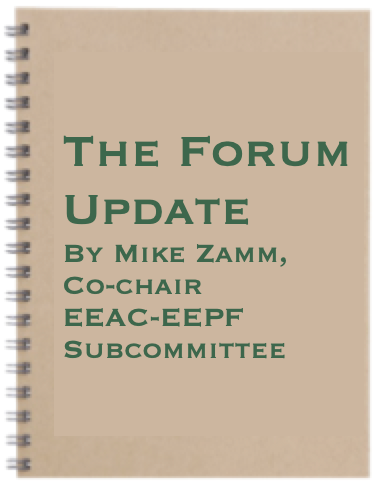
ENVIRONMENTAL EDUCATION PROJECTS FORUM (The Forum)
FORUM WORKSHOP V REPORT
Forty-six people signed up for the January 14, 2021 workshop; 27 actually participated in the zoom meeting with 22 staying for most of the two-hour session. The workshop began with a welcome from Environmental Education Advisory Council (EEAC) Chairperson River DiLeo and introductory statements from Forum Co-Chairs Mike Zamm and Dr. Mary Leou.
Mike focused on a brief history of the Forum and the transition from Teacher Environmental Education Preparation (TEEP) to the Forum. Mary stressed outdoor education as an important aspect of the Forum’s work and the significance of the Forum as a vehicle to promote environmental education.
Presentations of current Forum projects followed. River DiLeo, Fran Agnone and Shig Matsukawa of the EEAC Steering Committee discussed the Database on EE Resources (EE Clearinghouse) that has been in development since Forum Workshop I in 2016.
The Database, which is on the EEAC website, is ready to receive information on programs, curriculums, professional development opportunities, etc. from organizations and individuals throughout NYC and the surrounding region. It will hopefully become an invaluable source of projects and materials to be used in classroom and outdoors by teachers and non-formal educators. EEAC has commenced efforts to advertise this resource.
Mike Zamm and Mary Leou then discussed the TEEP Syllabi Bank (now a project of the Forum), which emerged as a project idea during an EEAC Steering Committee evaluation of Forum Workshop lV. Seven very detailed college courses aimed at preparing prospective teachers to involve their students of various ages in natural/life science, sustainability and environmental science classroom and outdoor education experiences, are currently in the syllabi bank.
Mike and Mary described these submissions from NYU, CCNY and Bank Street and issued a call for workshop participants to urge colleges of education to adapt the courses in their teacher preparation programs.
Soon outreach to colleges of education throughout city and state will begin, to make them aware of the bank with the hope that the schools of education or related academic subdivisions will submit courses and/or adapt one or more of the offerings to their teacher training curricula.
Currently, we estimate that approximately 15-20% of the 131 teacher training colleges and universities in New York State offer significant coursework in environmental education. This makes it difficult for many teachers to adequately prepare their students to master environmental content in State Syllabi and Standards or Regents Examinations.
It is also a dereliction of the responsibility to prepare youth to be informed and participating citizens in a world beset by climate change.
The third presentation in the segment on Forum related projects was the talk by Emily Fano, Senior Education Manager of the National Wildlife Federation, on “Current Initiatives in Support of Climate Change Education in New York City and State – the Work of the Climate and Resilience Education Task Force”(cretf.org).
Emily outlined a comprehensive set of programs and activities in the city and region. These include the NY-NJ Climate Education Youth Summit which will take place February 8-12 online (tiny.cc/climatesummit) and the Resilient Schools Consortium (RiSC) Program whose purpose is to “increase climate science and resilience knowledge and critical thinking skills of middle and high school students and empower them to build resilience in their communities”(riscnyc.org). A free RiSC curriculum is available at https://www.riscnyc.org.
Emily also mentioned efforts to advance climate education at the federal level. A letter was sent to US Climate Envoy John Kerry on 1-26-21, penned by the National Wildlife Federation, the North American Association of Environmental Education and signed by 180 organizations, asking that education be included in the Paris Climate Accord, using the US Alliance for Climate Education (ACE) framework as part of the pitch.
Also, a number of letters have been sent from a variety of organizations to the Biden-Harris Administration asking for climate education to be included in President Biden’s climate action plan.
For more detailed information on ACE and these national efforts contact Emily at fanoe@nwf.org.
Report continued: DISCUSSION GROUPS/PLENARY SESSION
For more information on TEEP, now part of the EEPF (Environmental Education Projects Forum), visit EEPF – The Forum.
About EEAC’s newsletter and blog
EEAC Newsletter
Copyright © 2021 Environmental Education Advisory Council of New York City.
All rights reserved.

